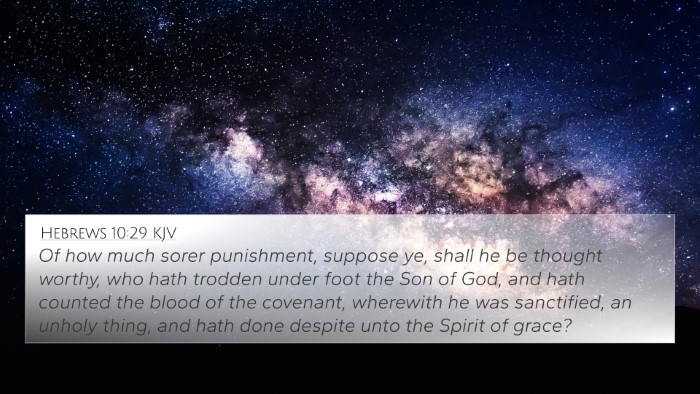Old Testament
Genesis Exodus Leviticus Numbers Deuteronomy Joshua Judges Ruth 1 Samuel 2 Samuel 1 Kings 2 Kings 1 Chronicles 2 Chronicles Ezra Nehemiah Esther Job Psalms Proverbs Ecclesiastes Song of Solomon Isaiah Jeremiah Lamentations Ezekiel Daniel Hosea Joel Amos Obadiah Jonah Micah Nahum Habakkuk Zephaniah Haggai Zechariah MalachiHebrews 6:6 Similar Verses
Hebrews 6:6 Cross References
If they shall fall away, to renew them again unto repentance; seeing they crucify to themselves the Son of God afresh, and put him to an open shame.
Uncover the Rich Themes and Topics of This Bible Verse
Listed below are the Bible themes associated with Hebrews 6:6. We invite you to explore each theme to gain deeper insights into the Scriptures.
Hebrews 6:6 Cross Reference Verses
This section features a detailed cross-reference designed to enrich your understanding of the Scriptures. Below, you will find carefully selected verses that echo the themes and teachings related to Hebrews 6:6 KJV. Click on any image to explore detailed analyses of related Bible verses and uncover deeper theological insights.

2 Peter 2:21 (KJV) »
For it had been better for them not to have known the way of righteousness, than, after they have known it, to turn from the holy commandment delivered unto them.

Hebrews 10:29 (KJV) »
Of how much sorer punishment, suppose ye, shall he be thought worthy, who hath trodden under foot the Son of God, and hath counted the blood of the covenant, wherewith he was sanctified, an unholy thing, and hath done despite unto the Spirit of grace?

Hebrews 6:4 (KJV) »
For it is impossible for those who were once enlightened, and have tasted of the heavenly gift, and were made partakers of the Holy Ghost,

1 John 5:16 (KJV) »
If any man see his brother sin a sin which is not unto death, he shall ask, and he shall give him life for them that sin not unto death. There is a sin unto death: I do not say that he shall pray for it.

Isaiah 1:28 (KJV) »
And the destruction of the transgressors and of the sinners shall be together, and they that forsake the LORD shall be consumed.

2 Timothy 2:25 (KJV) »
In meekness instructing those that oppose themselves; if God peradventure will give them repentance to the acknowledging of the truth;

Mark 15:29 (KJV) »
And they that passed by railed on him, wagging their heads, and saying, Ah, thou that destroyest the temple, and buildest it in three days,

Matthew 27:38 (KJV) »
Then were there two thieves crucified with him, one on the right hand, and another on the left.

Matthew 19:26 (KJV) »
But Jesus beheld them, and said unto them, With men this is impossible; but with God all things are possible.

Hebrews 12:2 (KJV) »
Looking unto Jesus the author and finisher of our faith; who for the joy that was set before him endured the cross, despising the shame, and is set down at the right hand of the throne of God.

Matthew 23:31 (KJV) »
Wherefore ye be witnesses unto yourselves, that ye are the children of them which killed the prophets.

Zechariah 12:10 (KJV) »
And I will pour upon the house of David, and upon the inhabitants of Jerusalem, the spirit of grace and of supplications: and they shall look upon me whom they have pierced, and they shall mourn for him, as one mourneth for his only son, and shall be in bitterness for him, as one that is in bitterness for his firstborn.

Luke 23:35 (KJV) »
And the people stood beholding. And the rulers also with them derided him, saying, He saved others; let him save himself, if he be Christ, the chosen of God.

Luke 11:48 (KJV) »
Truly ye bear witness that ye allow the deeds of your fathers: for they indeed killed them, and ye build their sepulchres.
Hebrews 6:6 Verse Analysis and Similar Verses
Understanding Hebrews 6:6
Hebrews 6:6 states:
"If they fall away, to renew them again to repentance, since they crucify again for themselves the Son of God, and put Him to an open shame."
This verse raises profound theological implications regarding apostasy, repentance, and the sacrifice of Christ. Scholars offer various insights into its meaning through public domain commentaries, providing a comprehensive view of this complex text.
1. The Context of Hebrews 6:6
The Book of Hebrews addresses Jewish Christians who were tempted to revert to Judaism. The apostle encourages them to understand the supremacy of Christ and the finality of His sacrifice. Understanding the context helps unravel the significance of verse 6 within the broader narrative.
2. The Meaning of Falling Away
- Matthew Henry: Matthew Henry elaborates that the phrase "fall away" refers to a complete and intentional departure from faith. It implies a willful rejection of the truth and grace offered through Christ.
- Albert Barnes: Barnes asserts that this "falling away" is not merely a weakness or a momentary lapse, but a deliberate, conscious turning away from faith in Jesus.
- Adam Clarke: Clarke emphasizes the gravity of such an act, suggesting it involves a hardened heart that chooses to deny Christ after having experienced His grace.
3. Renewing to Repentance
The second part of the verse mentions the difficulty of renewing such individuals to repentance. This illustrates the serious consequences of apostasy:
- Matthew Henry: He notes that genuine repentance should lead to a renewal of faith, yet for those who fully reject Christ, this becomes exceedingly challenging.
- Albert Barnes: Barnes emphasizes that it is not that God cannot renew them, but that their own rejection and hardened state make them resistant to repentance.
- Adam Clarke: Clarke argues that the deliberate decision to renounce faith creates an enduring separation from God, impairing one's ability to repent authentically.
4. Crucifying the Son of God Anew
The phrase "crucifying again for themselves the Son of God" indicates the severity of falling away:
- Matthew Henry: He asserts that this metaphorically indicates contempt for Christ's sacrifice, as one chooses to disregard the very price paid for salvation.
- Albert Barnes: Barnes argues that this act represents a severe insult to the grace of God, treating the sacrifice as common or insignificant.
- Adam Clarke: Clarke warns that this portrayal signifies a deep and willful rejection of the truth of the Gospel.
5. Putting Him to Open Shame
Lastly, the phrase “put Him to an open shame” communicates the public and visible nature of such rejection:
- Matthew Henry: He explains that this disgrace is not just personal but reflects poorly on the cause of Christ among the community.
- Albert Barnes: Barnes adds that this shame is intensified by the complete understanding of what one is renouncing—the glory of Christ's atoning sacrifice.
- Adam Clarke: Clarke suggests that shame comes from knowing the truth and yet choosing to oppose it, afflicting harm not only to themselves but to others’ perceptions of the Gospel.
6. Related Bible Verse Cross-References
Hebrews 6:6 connects thematically and theologically to various other scriptures:
- Matthew 12:31-32: Discusses the unforgivable sin, paralleling the gravity of rejecting the Holy Spirit.
- Hebrews 10:26-31: Expands on the consequences of willful sin after receiving knowledge of the truth.
- 2 Peter 2:20-22: Describes the fate of those who escape the world's corruption and then return to their former ways.
- Romans 6:6: Speaks of the crucifixion of our old self, contrasting the active choice to remain in sin.
- Galatians 5:4: Mentions falling from grace, indicating the dire consequence of abandoning faith.
- 1 Timothy 4:1: Warns of those who depart from the faith, influenced by deceitful spirits.
- James 5:19-20: Highlights the importance of turning back those who wander from the truth.
7. Conclusion and Thematic Reflections
Hebrews 6:6 invites a thorough examination of the themes of apostasy, repentance, and the nature of Christ's sacrifice. It compels readers to reflect on the seriousness of their faith and the consequences of turning away from divine grace.
In exploring this verse, the connections between various Bible verses emerge clearly, providing a lens through which believers can deepen their understanding of Scripture's teachings and its collective message about faith, fallibility, and the steadfastness of God’s promises.
8. Tools for Further Study
For those seeking a deeper understanding of Hebrews 6:6 and its connections to other verses, consider using the following tools:
- Bible concordance to identify cross-references easily.
- A Bible cross-reference guide for thematic studies.
- Online resources to conduct cross-referencing Bible studies.
- Study Bibles that provide annotations highlighting connections between verses.
- Biblical commentaries for insights from various theologians.



